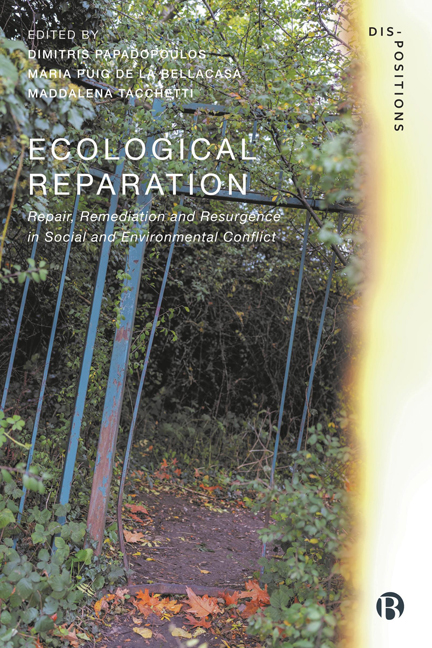Book contents
- Frontmatter
- Contents
- List of Figures
- Notes on Contributors
- Acknowledgements
- Note on the Figures
- Dis-Positions Series Preface
- Introduction: No Justice, No Ecological Peace: The Groundings of Ecological Reparation
- PART I Depletion<>Resurgence
- PART II Deskilling<>Experimenting
- PART III Contaminating<>Cohabiting
- PART IV Enclosing<>Reclaiming Land
- PART V Loss<>Recollecting
- PART VI Representing<>Self-governing
- PART VII Isolating<>Embodying
- PART VIII Growth<>Flourishing
- Index
10 - Land in Our Names: Building an Anti-Racist Food Movement
Published online by Cambridge University Press: 28 March 2024
- Frontmatter
- Contents
- List of Figures
- Notes on Contributors
- Acknowledgements
- Note on the Figures
- Dis-Positions Series Preface
- Introduction: No Justice, No Ecological Peace: The Groundings of Ecological Reparation
- PART I Depletion<>Resurgence
- PART II Deskilling<>Experimenting
- PART III Contaminating<>Cohabiting
- PART IV Enclosing<>Reclaiming Land
- PART V Loss<>Recollecting
- PART VI Representing<>Self-governing
- PART VII Isolating<>Embodying
- PART VIII Growth<>Flourishing
- Index
Summary
If you have come here to help me, you are wasting your time. But if you have come because your liberation is bound up with mine, then let us work together.
Aboriginal activists group, Queensland, 1970sLand in Our Names (LION) began in 2020 as a young collective with big plans for the year. At the Oxford Real Farming Conference in the UK, in January 2020, we facilitated a workshop with Leah Penniman of Soul Fire Farm on the topic ‘Farming So White: Land, Ownership, Race and Racism in Britain’ and held the first ever Caucus for Black and People of Colour (BPOC) growers, land workers, environmentalists and food justice organizers at Willowbrook Farm. It was an emotional experience for everyone who attended. We all remarked that we had never been in the countryside in Britain surrounded by People of Colour before. The care, excitement, community and safety that we shared with each other was energizing and made us even more dedicated. We want to speak to BPOC growers, land workers, land and food justice organizers.
Then our plans for the year took a dramatic turn with the pandemic and the Black Lives Matter demonstrations in the US, Britain and elsewhere. We have been humbled by the amount of people who have reached out to us asking for our thoughts and feelings. The truth is that we carry each life lost to racism with us always. It is a grief that we must manage every day. This is one of the reasons why we founded Land in Our Names – we want to create an anti-racist and inclusive land and food justice movement that speaks to Black and People of Colour. Racism is a structural and systemic problem that needs reparative justice in order to stop the unnecessary violence that People of Colour experience. That is why we see land reparations as crucial towards building resilient and sustainable anti-racist communities. We want to continue nurturing our fledgling network of BPOC growers, land workers, organizers, educators and enthusiasts with empowering and inspiring events. We want to create resources that look at food and land justice through an intersectional lens. We want to support BPOC growers’ access to land and work.
- Type
- Chapter
- Information
- Ecological ReparationRepair, Remediation and Resurgence in Social and Environmental Conflict, pp. 161 - 163Publisher: Bristol University PressPrint publication year: 2023

